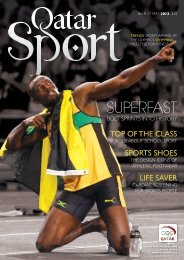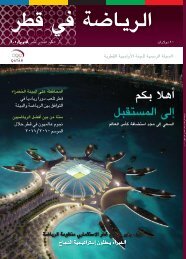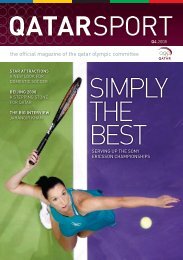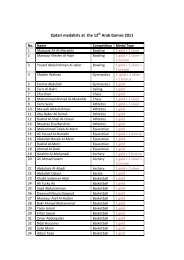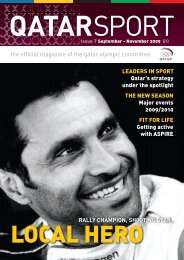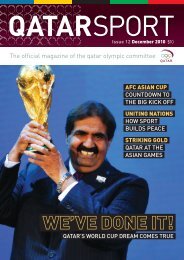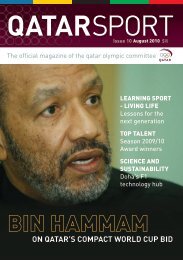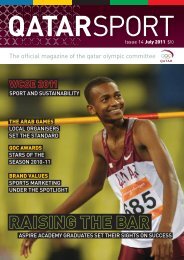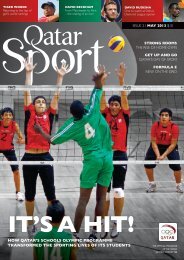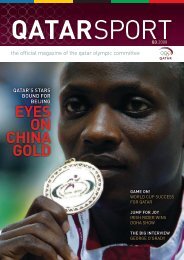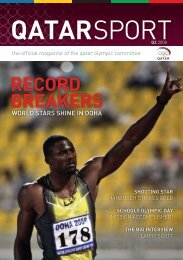You also want an ePaper? Increase the reach of your titles
YUMPU automatically turns print PDFs into web optimized ePapers that Google loves.
Left: Michael Browne, head of<br />
the Aspire football programme<br />
leads a coaching team that<br />
has prepared Aspire students<br />
for youth matches against<br />
the likes of FC Basle, Ireland,<br />
Tottenham Hotspur and FC<br />
Kopenhagen (pictured right)<br />
programme, which lasts five years. At Aspire they receive<br />
not only the best football coaching available but a wideranging<br />
education, which draws, wherever possible, upon<br />
sport for example and inspiration. While some of the boys<br />
live at home with their families, others find it more<br />
convenient to board at Aspire, living football 24/7.<br />
But even before they are invited to join the Aspire<br />
programme, the boys have been watched for a number of<br />
years. <strong>Qatar</strong> has one of the world’s most comprehensive<br />
and technically advanced talent identification programmes<br />
across all sports but, says Browne, the observations of<br />
coaches were more important than hard data in the early<br />
days. “We start to identify boys around the ages of 9 and<br />
10-years-old and work with them in three groups of up to<br />
30 for a couple of years. Then, at the age of 12, around 60<br />
are selected for Aspire. Our aim at that stage is to keep<br />
them on the programme as long as possible although,<br />
inevitably, some will drop out along the way.”<br />
At Aspire the students enjoy a demanding yet clearly<br />
rewarding schedule, which involves early morning and<br />
afternoon training sessions (a total of three hours per day)<br />
built around a first-class academic regime.<br />
Morning training tends to be a low-intensity session<br />
which focuses on developing technical skills. In the<br />
afternoon the emphasis is on speed, agility and endurance<br />
work. “The staff works as a team to get the best out of the<br />
players at every stage,” he said. “Three times a year we will<br />
carry out rigorous physical testing so that we know exactly<br />
what areas we need to develop in every individual player.<br />
Every one of our players is also registered with a local club<br />
and is expected to play for their teams as well.<br />
“They are recognised as the best players in the country<br />
at their age group and know that while they are privileged<br />
they also have a responsibility in the way that they behave<br />
and live their lives.”<br />
Indeed, the <strong>Qatar</strong>i youngsters coming through the<br />
system at Aspire have done much to radically alter the<br />
preconceptions of some observers. “There has tended to be<br />
a perception among some Westerners that the <strong>Qatar</strong>i boys<br />
lack the discipline and the dedication required to become<br />
really good footballers. I’m delighted that our boys are<br />
proving that this is simply not true. They share a<br />
determination to make it as footballers,” Browne explained.<br />
“While in the early days we found that some of the<br />
youngsters didn’t deal with adversity particularly well, that<br />
has been addressed.”<br />
If Browne faces one largely insurmountable difficulty it<br />
is that the majority of the <strong>Qatar</strong>i youngsters are smaller<br />
than their overseas counterpart in their early years at<br />
Aspire. The result is that when they play games against<br />
youth teams of an equivalent age from leading clubs from<br />
around the world, they are at a physical disadvantage.<br />
“As the years go by the physical gap becomes less<br />
pronounced and less of a factor in results,” says Browne.<br />
“As a result, our older teams are at least on a par with many<br />
of the top European clubs we have played.”<br />
And when you consider that list includes<br />
teams like Barcelona, Chelsea, Tottenham,<br />
Hotspur and Bayer Leverkusen, the scale of<br />
the achievement becomes clear.<br />
“Over the last year and a half in particular<br />
I have become convinced that what we are<br />
doing here is working,” said Browne.<br />
One of the reasons for that success is the<br />
catalytic role played by a small group of<br />
overseas students, who have joined the local<br />
players as a result of the Aspire Africa<br />
programme which aims to provide<br />
development opportunities for young players<br />
from African nations. At present there are<br />
seven African students in Doha, from Ghana,<br />
Cameroon, Senegal and Nigeria.<br />
“The African players are very dedicated<br />
and physically bigger at an early age. They<br />
have integrated well and have helped raise the<br />
overall level among the players,” said Browne.<br />
“At the end of their time here we will help<br />
then to develop their careers, whether in their<br />
homelands or elsewhere. They are certainly<br />
not expected to stay and play for <strong>Qatar</strong>.”<br />
Finding the next step from Aspire is an<br />
issue which plays on Michael Browne’s mind.<br />
The domestic <strong>Qatar</strong>i League has only 10<br />
teams and many places are held by overseas<br />
players. And while they have naturally helped<br />
raise the standard of the league, their presence<br />
means that there are fewer first team places for<br />
emerging <strong>Qatar</strong>i talent.<br />
“To continue their development our<br />
players need to be playing first team football<br />
and while in other countries they might be<br />
loaned out to lower league clubs for experience,<br />
that can’t happen here.<br />
“I think that rather than playing in reserve<br />
teams in <strong>Qatar</strong> it would be better for them to<br />
embrace the professional game by playing in<br />
Europe. And while they may not make it at<br />
clubs in the major markets, our best 18 yearold<br />
could certainly play in the second divisions<br />
of, for example, Belgium, Switzerland and<br />
Denmark. With that experience they can then<br />
go on to a higher level.”<br />
Browne is unequivocal as he reflects on his work at<br />
Aspire and expectations for the future. “As far as I can see<br />
there is nothing like Aspire anywhere else in the world and<br />
the quality of the facilities and the programme demonstrates<br />
how important it is for <strong>Qatar</strong> to develop local players.<br />
“I am confident that in the next five to 10 years we will<br />
have a stream of players which will give <strong>Qatar</strong> a chance of<br />
qualifying for the World Cup finals. That could be in<br />
2018, 2022…who knows? What is certain is that we are<br />
producing players who are better than ever before.”<br />
o o o o o o o o o<br />
player<br />
development<br />
Q5.09 <strong>Qatar</strong>Sport 25



